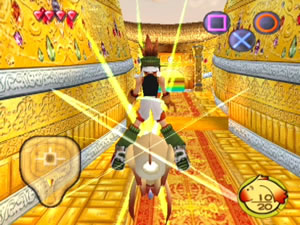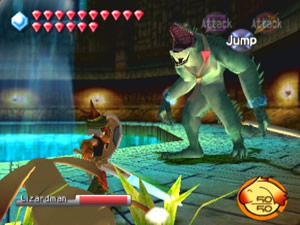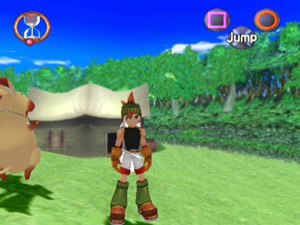Two hearts beat as one.
Dreams are a window to the soul, a doorway to the subconscious, a bus ticket
to Weirdsville. Once, while working on a programming assignment, I had a dream
completely in code. It was like one big Matrix screensaver. Another time I was
watching an eBay auction while reading through “Armies of the Night.” Later,
I dreamt that Norman Mailer was trying to sell me a DVD.
And
like every single person reading this, I have plenty of video game dreams. While
reviewing Kingdom Hearts, I dreamt I was arguing
with Scrooge McDuck, demanding that he let me swim in his money bin. The obstinate
old fart wouldn’t give in, so I woke up. Poor, no less.
But in the world of Dual Hearts, dreams are more than just a way to
process your waking events. Dreams are portals to other planes of existence,
particularly for Rumble, an accomplished treasure hunter focused on uncovering
the mystical Dream Stone while visiting tropical Sonno Island. Tumble, hailing
from the Dream realm, is a wacky amalgam of a cow, dog, pig, and rabbit; his
overarching classification is a Baku, a “dream animal.” Together, this odd couple
must combine forces to save humanity from the Nightmare that seeks to devour
existence.
So the story is a little obtuse. Still, Dual Hearts delivers enough
concrete gameplay to justify its ethereal backstory.
While on Sonno Island, day and night intermittently pass by and NPCs run through
simple schedules. During the day, you might catch a character lounging by the
beach, while at night you’ll find him nursing a drink at the bar. When you’ve
finally found a sleeping villager at the right time in the game, you can jump
into their dreams and mucky-muck about in their inner psyche. These play out
as linear platform levels, taking you through the dreamer’s inner woes and dilemmas
manifested as enemies and puzzles to overcome. And at the end of it all is a
boss villain ready to take you on.
Apparently psychiatrists have had it all wrong this whole time. The best way to fix an unfettered mind is to jump in through their ear and defeat the madness by jumping around. Who would have thunk it?
The bulk of the gameplay is real-time action similar to Zelda.
Throughout his adventures, Rumble gains multiple weapons that can be slowly
powered up to inflict more damage. The weapons lead to some clever gameplay
ideas as they can be used both for attacking and puzzle-solving. A charged sword
can act like a bat to break down certain obstacles. A charged spear can be spun
to whisk objects skywards.
This tends to be used too simply, though. Often, it just requires a standard retread of past levels to unlock the mysterious object that can now be interacted with thanks to your trusty new weapon. It’s a little too obvious and linear.
 Rumble
Rumble
also has Tumble on hand for support. Tumble can refill lost health segments
and offer encouraging hints and advice when asked. When Rumble hops on Tumble’s
back, he has access to such Baku moves as a higher jump, a running jaunt, and
the always-cursory butt bounce.
Boss characters often require repetitive actions. After you’ve figured out
the basic pattern, you must repeat an often-tiring number of times.
The camera is somewhat poor. There is an automatic lock as well as a controllable lock that can be utilized in the heat of battle, but the normal camera controls are limiting in their range of motion and distance.
The visual quality of Dual Hearts is inconsistent. Diving into the
game, you’ll start in a gaudy golden world, where the flashy colors are a step
backwards to PSX days. But beautiful sunrises and sunsets happen as each day
passes; the orange glow gives the game a classic bedtime book feel. Dual
Hearts tends to overuse graphic filters such as blurring and a colored pencil
effect. Unfortunately, the latter leads to a pretty noticeable framerate loss.
Also, the game uses a very slow screen melt as new sections of the game are
loaded up. It’s better than a bland loading screen, but even better would be
none at all.
There are a few standout melodies, but the music is generally fair and fitting
to the world of Dual Hearts. There are no voices besides an opening narration
that is a little on the serious side for what turns out to be a breezy adventure.
Dual Hearts will likely be lost in the tide of major recent releases
like Kingdom Hearts, but its varied attacks and dreamy underpinnings
could prove as a bridge for the younger gamer looking to one day embroil himself
in harder, more difficult quests. It is indeed like an earnest daydream – simple,
happy and light.

-
Action / adventure lite
-
Range of weapons and uses
-
Tumble rocks!
-
Fluctuating graphic quality
-
Inconsistent camera
-
Somewhat easy







